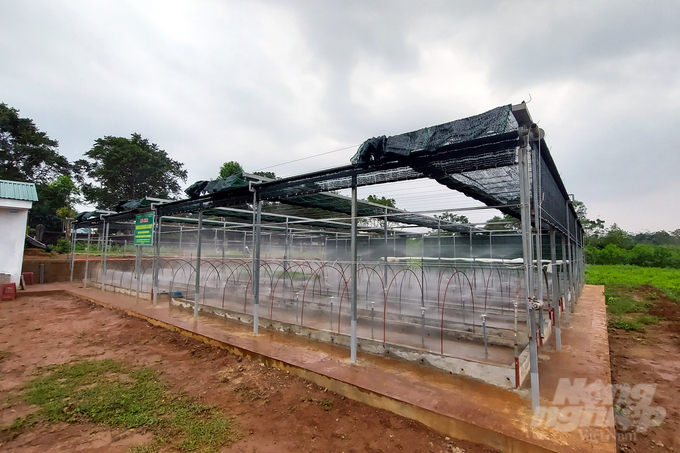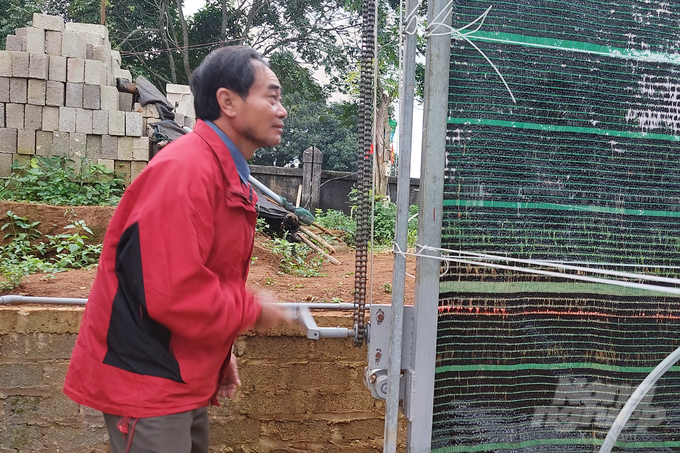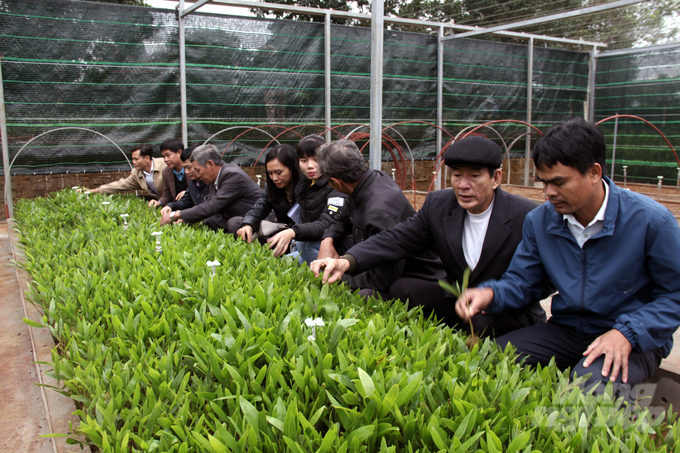The Keo Son Sustainable Forestry Cooperative Improved Nursery (Cam Nghia Municipality, Cam Lo District, Quang Tri) was established as part of the project to support the construction of improved nurseries for the production of high-quality seedlings (acacia hybrid fabric). This is one of the programs being carried out to develop the plantation wood material area in Quang Tri.

The Keo Son Sustainable Forestry Cooperative’s innovative nursery was established as part of the project to support the construction of improved nurseries for the production of high-quality seedlings. Picture: From crap.
This nursery has an area of 1,000 m2. The area of the fabric nursery is 230 m2/house, the extension and side garden around 770 m2.
Cooperatives are supported with sectional house frames; shading systems that regulate overhead and ambient light; sprinkler irrigation, rain spray; cutting beds; Submersible storage tanks, improved pumping stations, water supply lines; power line system.
The children’s beds are made of concrete, covered and watered fully automatically. When automatic operation is not possible (due to power failure), the above system can be operated mechanically.
The nursery transplanted acacia hybrid seedlings produced by tissue culture methods, which are acacia hybrid tissue lines such as AH1, BV16, AH6…, using microbial phosphorus fertilizer to fertilize the seedlings. There are also other serving materials such as potting soil, pot bowls…
Acacia varieties produced by tissue culture methods have the advantages of controlling seed quality, high uniformity, disease-free, and can be produced in large quantities on an industrial scale in a short period of time in all weather conditions.
The product of the project is a seedling suitable for afforestation at a price reduced by 30-40% compared to buying traditional seedlings for planting forests.

When automatic operation is not possible (due to a power outage), the systems at Keo Son Sustainable Forestry Cooperative’s innovative nursery can be operated mechanically. Picture: From crap.
Along with many other schemes under construction, the Keo Son Sustainable Forestry Cooperative’s improved nursery is expected to provide a source of quality seedlings for Quang Tri forest farmers.
Le Phuc Nhat, director of the cooperative, said that a standard nursery is one of the factors that help improve the quality of the seedlings. In the coming period, Mr. Nhat looks forward to consuming the source of seedlings from the nursery.
The project to support the construction of nurseries to improve the production of high-quality seedlings (hybrid acacia) for the area of plantation wood material is invested by the National Center for Agricultural Extension. Quang Tri Province alone has been allocated nearly VND 3.7 billion to build 3 models in 3 years. The Provincial Agricultural Advisory Center is the entity directly implementing this project.
Mr. Tran Can, director of Quang Tri Province Agricultural Advisory Center, said that building a nursery and transferring the production process of high-quality seedlings will help Quang Tri be proactive in seed work. From there, the value of the forests planted will also increase, gradually realizing the goals of the province.
According to Can-san, Quang Tri aims to become the center of the central engineered wood region. Therefore, building nurseries to improve forest tree varieties will create the best conditions for forest farmers to access high-quality seed sources and meet the demand for large-scale timber plantations and FSC-certified forests.

The quality of forest tree varieties in Quang Tri increasingly meets the demand for high-quality afforestation. Picture: From crap.
According to statistics, there are currently 38 forest tree seed production and trading branches throughout Quang Tri Province, putting about 24-26 million seedlings on the market annually. Of these, approximately 96% are acacia species and 4% are native tree species to meet the needs of afforestation in the region.
Acacia species are mainly acacia hybrids with lines BV10, BV16, BV32, BV33, BV73, BV75, AH1, AH7. These are all fast-growing, high-yielding varieties that have been recognized as national varieties and technically advanced varieties by the Department of Agriculture and Rural Development.
In 2019, through crossbreeding and selection research at the North Central Forest Science Center booth (Cam Hieu Municipality, Cam Lo District), Vietnam Academy of Forestry Sciences selected two Ministry-approved hybrid lines of acacia BV523 and BV523, BV584 for agriculture and rural Development.
At present, there are 3 institutions that have invested in tissue culture technology: Quang Tri Science and Technology Application Center, North Central Forest Science Center, Quang Tri Technical College with machinery and equipment Advanced equipment, average capacity of 1 million seedlings/year.

